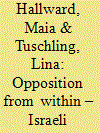| Srl | Item |
| 1 |
ID:
174603


|
|
|
|
|
| Summary/Abstract |
Protests in response to Israeli military action in the Occupied Territories have a long history in Israel. While such opposition movements in many countries are comprised of civil society activists, the dynamics of protest differ in Israel because of the country’s mandatory military service. From the 1980s to present day, former and current Israeli soldiers have used a wide range of methods, tactics, and strategies to challenge Israeli military actions. Using insights from nonviolent resistance theories, we examine how the approaches and goals of military opposition groups in Israel have changed over the past decades. Specifically, we develop a typology to explain why different types of protest arise from within the Israeli Defense Force that garner strong reactions – whether laudatory or derogatory – from the Israeli government and general public. The paper concludes with lessons learned for military opposition movements in the context of nonviolent resistance theory and practice.
|
|
|
|
|
|
|
|
|
|
|
|
|
|
|
|
| 2 |
ID:
103118


|
|
|
|
|
| Publication |
2009.
|
| Summary/Abstract |
When does bargaining between government and opposition groups turn violent? In this article, I argue that groups with cohesive, developed organizational structures are less likely to engage in conflictual behavior. Opposition movements are often divided into moderate and radical challengers, and groups without developed organizational structures cannot limit radicals' demands. The argument is supported in a comparative analysis of bargaining processes in Algeria and Chile in the late 1980s. In Algeria, the primary opposition group was marred by internal divisions and tensions between radical and moderate elements. When the party emerged victorious in democratic elections, the government feared that radical elements would soon take over, canceled election results and attempted to reestablish control by using force. Opposition parties in Chile, however, presented a cohesive and unified alternative to the Pinochet regime, which contributed to a peaceful transfer of power.
|
|
|
|
|
|
|
|
|
|
|
|
|
|
|
|